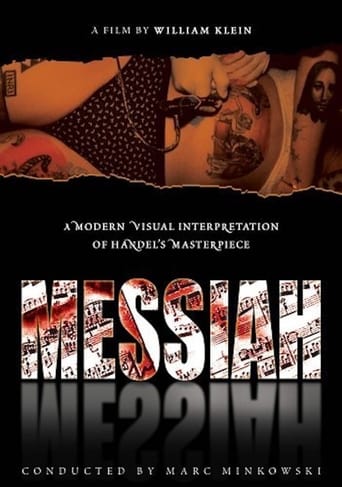TheLittleSongbird
'Messiah', along with Mendelssohn's 'Elijah', is to me the greatest oratorio ever written and one of the greats in the choral repertoire (Verdi and Mozart's Requiems are up there too). It's no wonder that it's Handel most performed and celebrated work.This film version is interesting enough, and has enough to recommend, but of the DVD 'Messiahs' available it is my least favourite. Much prefer the Christopher Hogwood, Stephen Cleobury and Claus Guth-directed (staged like a filmed opera, and more humanised, and it worked) performances.As aforementioned, there is a lot to like. It is superb musically. The orchestra achieve a perfect balance of authenticity, refinement energy, rousing power and pathos, with a beautifully produced sound. As well as being rousing in the "Hallelujah" chorus to nuanced in arias like "I Know that My Redeemer Liveth". The chorus have a lot to do, and it's not easy music, needing a lot of sound, a wide dynamic range and flexibility, which this chorus have. They are particularly good in "Hallelujah", "For Unto Us a Child is Born" and the "Amen" chorus.Supporting them every step of the way is Marc Minkowski. Despite specialising more in French baroque music, Minkowski does a fine job here, conducting with finesse, elegance, energy and dramatic intensity. The soloists are uniformly excellent, Charlotte Hellekant is particularly remarkable while ethereal Lynne Dawson and intense but expressive John Mark Ainsley are not far behind. "He was Despised", "How Beautiful are the Feet" and "The Trumpets Shall Sound".Less good is the direction and some of the images. This version of 'Messiah' does look striking and beautiful as well as rich in atmosphere, apart from some extreme close ups that cuts off parts of heads. There are some memorable images, especially the prison chorus and the man in the dessert, that were vivid and moving. "The Trumpets Shall Sound" was fun too.At the same time, it's a bit fragmented and too many of the images hold little relevance to the meaning of the music, juxtapose too much with the words and have little point. "He Shall Feed His Flock" fares particularly badly here, but even worse is the heavy-handed and gratuitously gruesome visuals for "Why Do the Nations".Overall, interesting and musically superb, but doesn't entirely work. 7/10 Bethany Cox
j_parer
This is the most creative recording of Handel's Messiah I have seen.The alto Hellecant does a very passionate, quite remarkable version of "He was despised". The soprano aria "How beautiful are the feet" is moving, and the images shown along with it are coherent. I found the most inspired selection of visuals to be for the track "The trumpet shall sound", which features Christian weight-lifters strutting their stuff, its quite funny and so appropriate for the song! William Klein has been sensitive enough not to show images from outside the studio for songs such as "Thou shalt break them", choosing to film instead the tenor's face at close-range, revealing all his concentration and intensity: the singer's expression is a better illustration for this song than any scene Klein could have found elsewhere.Despite Handel's German origin, The Messiah was composed in England and the original libretto is from the English Bible. In this case it is being performed by the French Musiciens du Louvre, in English.*It does contain one VERY GRUESOME scene of violence, shown in the "Why do the nations" track. Simply skip that track or else do not show it to kids.*
richardtidyman
As has been pointed out, Messiah has an English libretto, but there are a number of different language versions.Perhaps Klein wanted to make more of an international film. After all, the film depicts scenes from around the world. I know our Francophone friends would be distressed to learn that English is now the international language.
bpofuk
I just have to correct Marcus Berg, because he did big factual mistake commenting Messiah, which could confuse people who don't know. The original language of Haendel's oratorio Messiah IS English! Haendel spent the most of his fruitful years as composer in London, where he also composed this great oratorio. By the way, for everybody who loved the music, the "sound track" CD is out on Deutsche Grammophon Archiv Produktion (471 341-2 AH2).
